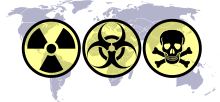| Revision as of 15:17, 7 December 2005 editThis username is just a name nobody's using or will want 657657 (talk | contribs)83 editsNo edit summary← Previous edit | Revision as of 10:10, 22 December 2005 edit undo137.208.233.35 (talk) →Biological WeaponsNext edit → | ||
| Line 15: | Line 15: | ||
| According to ], who was deputy-director of ], the Soviet biological weapons agency, and who defected to the USA in 1992, weapons were developed in labs in isolated areas of the Soviet Union including mobilization facilities at ], ] and ] and research facilities at ], ] and ]. These weapons were tested at several facilities most often at "Rebirth Island" (]) in the ] by firing the weapons into the air above monkeys tied to posts, the monkeys would then be monitored to determine the effects. | According to ], who was deputy-director of ], the Soviet biological weapons agency, and who defected to the USA in 1992, weapons were developed in labs in isolated areas of the Soviet Union including mobilization facilities at ], ] and ] and research facilities at ], ] and ]. These weapons were tested at several facilities most often at "Rebirth Island" (]) in the ] by firing the weapons into the air above monkeys tied to posts, the monkeys would then be monitored to determine the effects. | ||
| There were |
There were accidents including one at ] (Yekaterinburg) where supposedly there was an accidental ] release when filters were not properly installed and people across the street in a factory fell ill and died. This is still officially considered by the Russian government as an infection from rotting meat that was sold on the black market. | ||
| <!-- While developing this programme the Soviets presumed the USA was also developing an offensive programme; they were not. --> | |||
| ==Chemical Weapons== | ==Chemical Weapons== | ||
Revision as of 10:10, 22 December 2005
Russia possesses one of the two largest stockpiles of weapons of mass destruction in the world (the United States possess the other). Russia declared an arsenal of 40,000 tons of chemical weapons in 1997 and is said to have around 19,000 nuclear weapons stockpiled in 2002 with perhaps only 8,500 of them operational. Russia ratified the Geneva Protocol on January 22, 1975 with reservations. The reservations were later dropped on January 18, 2001.
Nuclear Weapons
Russia is said to have around 19,000 nuclear weapons stockpiled in 2002 with perhaps only 8,500 of them operational. Russia is one of the five "Nuclear Weapons States" (NWS) under the Nuclear Non-Proliferation Treaty, which Russia ratified (as the Soviet Union) in 1968.
Following the dissolution of the Soviet Union in 1991, a number of Soviet-era nuclear warheads were transferred to Russia from Kazakhstan, Belarus and Ukraine, leaving Russia as the sole inheritor of the Soviet nuclear arsenal. It is estimated that the USSR had approximately 35,000 nuclear weapons stockpiled at the time of its collapse.
In 2002, the United States and Russia agreed to reduce their stockpiles to not more than 2200 warheads each in the SORT treaty. In 2003, the US rejected Russian proposals to further reduce both nation's nuclear stockpiles to 1500 each.
Biological Weapons
Russia signed the Biological Weapons Convention on April 10, 1972 and ratified the treaty on March 26, 1975.
According to Ken Alibek, who was deputy-director of Biopreparat, the Soviet biological weapons agency, and who defected to the USA in 1992, weapons were developed in labs in isolated areas of the Soviet Union including mobilization facilities at Omutininsk, Penza and Pokrov and research facilities at Moscow, Stirzhi and Vladimir. These weapons were tested at several facilities most often at "Rebirth Island" (Vozrozhdeniya) in the Aral Sea by firing the weapons into the air above monkeys tied to posts, the monkeys would then be monitored to determine the effects.
There were accidents including one at Sverdlovsk (Yekaterinburg) where supposedly there was an accidental anthrax release when filters were not properly installed and people across the street in a factory fell ill and died. This is still officially considered by the Russian government as an infection from rotting meat that was sold on the black market.
Chemical Weapons
Russia signed the Chemical Weapons Convention on January 13, 1993 and ratified it on November 5, 1997. Russia declared an arsenal of 40,000 tons of chemical weapons in 1997.
Russia met its treaty obligations by destroying 1% of its chemical agents by the Chemical Weapons Convention's 2002 deadline but requested technical and financial assistance and extensions on the deadlines of 2004 and 2007.
External links
- Abolishing Weapons of Mass Destruction: Addressing Cold War and Other Wartime Legacies in the Twenty-First Century By Mikhail S. Gorbachev
- Nuclear Threat Initiative on Russia
- UK statement on the chemical weapons convention
- 1999 Nuclear stockpile estimate
- Nuclear Notebook: Russian nuclear forces, 2005, Bulletin of the Atomic Scientists, March/April 2005.
